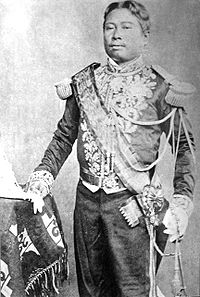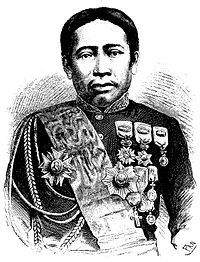- Norodom of Cambodia
-
Norodom I King of Cambodia 
King of Cambodia Reign 1860-1904 Predecessor Ang Duong Successor Sisowath I Issue 62 sons and daughters House House of Norodom Born February 1834
Angkor Borei, CambodiaDied 24 April 1904 (aged 70)
Phnom Penh, CambodiaReligion Theravada Buddhism Norodom I (Khmer: ព្រះបាទនរោត្តម) (1834–1904) ruled as king of Cambodia from 1860 to 1904. He was the eldest son of King Ang Duong, who ruled on behalf of Siam, and half-brother of Prince Si Votha as well as the half-brother of King Sisowath. Norodom is cognate with Narottam in Sanskrit which means Best (Uttam) of men (Nar). Norodom was considered to be the first modern Khmer king. He was credited with saving Cambodia from disappearing altogether. In 1863, to prevent the two powerful neighbours, Vietnam and Siam, from swallowing Cambodia altogether he invited France to make Cambodia its protectorate. However, he sent many letters to Siam claiming French Admiral de la Grandière had forced him into signing a false treaty. Many Cambodians believed that this brilliant act and his shrewdness did actually save Cambodia from disappearing.
When he was born, Cambodia was under Vietnamese (Annamese) and Siamese rule. The two powers had partitioned the country between them, but the royal family, being related to the Siamese, remained in the Siamese zone, as the Vietnamese were more authoritarian than the Siamese. Nonetheless, Vietnam and Siam frequently fought wars over Cambodian territory. The royal capital of Cambodia was in Oudong (named for the first King of Ayutthaya), but the main center of the area was the capital of Siam in Bangkok. Prince Norodom was sent by his father to study in Bangkok, where he studied Siamese (Thai), Politics, Buddhist scriptures and the ancient Pali language.
Contents
Rule
In 1860, when King Ang Duong died, Norodom became his successor but remained uncrowned because the Siamese royal court refused to release the Cambodian royal regalia, which made Norodom only a viceroy of the Siamese king.
At the same time, King Norodom inherited a major Cham rebellion against Khmer rule which his father began to put down but died before he could defeat them. In 1862, Norodom lost control over the region, abandoned the capital of Odong and fled to the safety of Battambang (though the capital was still at Odong). He later fled Cambodia altogether and went into exile in Bangkok. Seeing that the Siamese and Vietnamese overlords had gotten Cambodia into civil strife, the French forced King Norodom to return to Odong in 1863 and sign a treaty of protection with France. This transferred the country from Siamese and Vietnamese to French colonial rule. Cambodia thus became an independent French protectorate, though it was highly autonomous.
With Cambodia a French Protectorate, the Siamese royal court agreed to let Norodom be crowned king. In 1864 Norodom was crowned, the coronation being supervised jointly by the French and Siamese officials. Nonetheless, the young king began his rule over a country in civil turmoil. The Siamese and the Vietnamese had traditionally treated Cambodia as a buffer state, but France encroached on both Siamese and Vietnamese territory. However, the country was weak and subject to the power struggles between France and Siam. Not only were there rebel groups intent on getting the Siamese and the Vietnamese out of Cambodia, but also bandit groups.
Nonetheless, in 1884, France took control of Laos and overran Vietnam. France and Siam entered into the Franco-Siamese War (1893) over Laos, ending with a treaty ceding Laos to France after the French blockade of Bangkok. In 1907, Siam ceded Battambang and Siem Reap, its last claim in Cambodia after continued pressure from France.
French Protectorate
In 1884, the French authorities forced King Norodom to sign a treaty giving the French Protectorate virtually complete administrative control over Cambodia, including finances, a life line of Norodom's rule. Norodom resisted but with the French gunboats anchored outside the front gate of the royal palace he had no choice but to sign. The French actions cause widespread popular anger. In 1885 and 1886 Prince Si Votha, Norodom's half brother led a revolt against the French rule. The French suspected that Norodom was secretly supporting Si Votha's actions and the French blamed him for inciting the revolts. The revolt ended when the Cambodians were assured by King Norodom that the French had offered concessions to him. After the restoration of the calm of 1885-1886 revolt, Norodom was in a position of temporary strength. To prevent another revolt, the French was less inclined to force the king to the wall once more.
Following the Sino-French War (1884–1885), French Indochina was formed in October 1887 from Annam, Tonkin, Cochinchina (who together form modern Vietnam) and the Kingdom of Cambodia.
For the remainder of his rule Norodom was a puppet of the French. Before he died in 1904, he appointed his son, Prince Yukanthor, as heir apparent to the throne. But Yukanthor had a fall-out with the French and did not succeed to the throne. The French moved the capital from Oudong to Phonm Penh. Norodom could do nothing to prevent this, and died in 1904 in Phnom Penh. His body was cremated in the traditional Buddhist fashion in 1906.
He was succeeded by his half-brother and the Crown Prince, Prince Sisowath.
He is considered to be the first modern king of Cambodia. [1]
Honours
- Grand Croix of the Légion d'honneur-1872 (Grand Officier-1869) (Chevalier-1865) (France)
- Knight Grand Cross of the Order of the White Elephant (Siam)
- Knight of the Order of the Maha Chakri (Siam)
References
- ^ legal
1. Encyclopædia Britannica.com 2. Milton E. Osborne, The French Presence in Cochinchina and Cambodia
Preceded by
Ang DuongKing of Cambodia
1860 to 1904Succeeded by
SisowathCategories:- 1834 births
- 1904 deaths
- Cambodian monarchs
- Cambodian Buddhists
- Knights Grand Cross of the Order of the White Elephant
- Grand Croix of the Légion d'honneur
- Knights of the Order of the Royal House of Chakri
Wikimedia Foundation. 2010.

